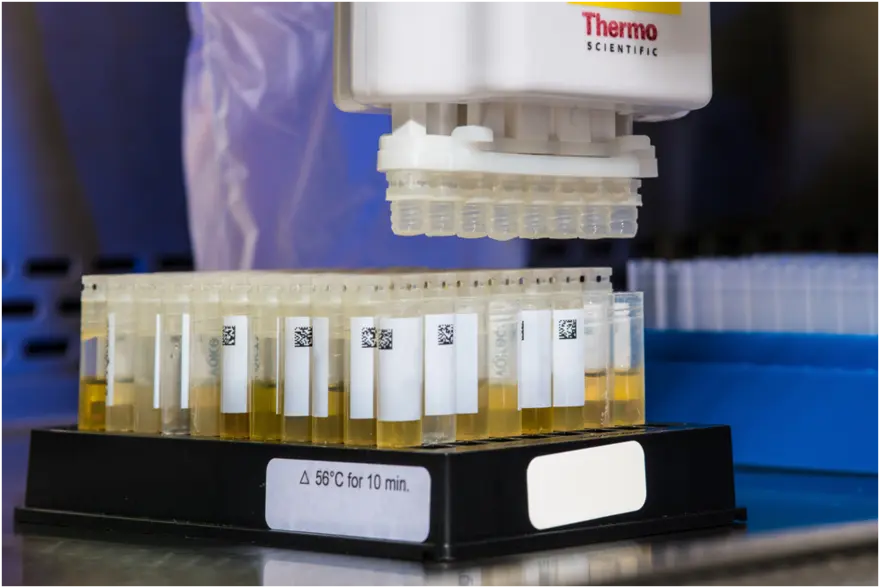Preventive Healthcare
Urine Culture Test: Procedure, Preparation and Results

Table of Contents
- What is a Urine Culture Test?
- Who Needs A Urine Culture?
- What is the Difference Between a Urine Culture Test and Urinalysis?
- What Happens During A Urine Culture?
- What Are Other Ways to Collect Urine Samples?
- How Long Does a Urine Culture Take?
- What are the risks of a Urine Culture?
- What Does a Positive Urine Culture Test Result Mean?
- What Does a Negative Urine Culture Test Mean?
- Conclusion
What is a Urine Culture Test?
A urine culture test is a laboratory procedure used to detect and identify bacteria or fungi present in a urine sample. It plays a crucial role in diagnosing urinary tract infections (UTIs) that may affect the bladder, kidneys, ureters, or urethra. The primary goal of a culture examination of urine is to pinpoint the exact organism causing the infection.
During the test, the urine sample is placed on a special nutrient-rich medium that encourages the growth of microorganisms. Over 24 to 72 hours, any bacteria or fungi in the sample multiply, making them easier to identify. The laboratory then determines the type and quantity of the organism.
A urine culture sensitivity test is also performed to find out which antibiotics are most effective in treating the specific infection. This ensures targeted treatment, which helps in faster recovery and prevents antibiotic resistance.
Interestingly, Escherichia coli (E. coli) is responsible for nearly 90% of UTIs, making it the most common organism detected in urine cultures. Overall, the test is essential for guiding proper treatment and reducing complications associated with urinary infections.
Who Needs A Urine Culture?
A urine culture test is typically recommended for individuals showing signs of a urinary tract infection (UTI). Common symptoms include a burning sensation while urinating, a frequent or urgent need to urinate, cloudy or foul-smelling urine, blood in the urine, lower abdominal or back pain, fever, and chills. These signs suggest a possible bacterial infection that needs to be identified accurately.
Doctors may also suggest a urine culture test for people who experience recurrent UTIs, pregnant women, those with structural issues in the urinary tract, or individuals with weakened immune systems. In such cases, a culture urine sensitivity test helps determine the most effective antibiotic by identifying the bacteria causing the infection and checking its response to different medications. This ensures targeted treatment and reduces the risk of complications.
What is the Difference Between a Urine Culture Test and Urinalysis?
While both a urinalysis and urine culture test require a urine sample, they serve different diagnostic purposes. Urinalysis is a quick screening test that analyses the urine for the presence of red blood cells, white blood cells, bacteria, protein, glucose, and other substances. It can indicate the likelihood of an infection but does not identify the specific causative organism.
On the other hand, a urine culture sensitivity test is a more detailed investigation. It involves growing microorganisms from the urine sample to identify the exact bacteria or fungi responsible for the infection. The culture urine sensitivity also determines which antibiotics will be most effective in treating the infection.
Table: Difference Between a Urine Culture Test and Urinalysis
|
Feature |
Urinalysis |
Urine Culture Test |
|
Purpose |
Quick screening for signs of infection or abnormalities |
Detailed identification of the specific organism causing infection |
|
What It Detects |
Red blood cells, white blood cells, bacteria, protein, glucose, and other substances |
Specific bacteria or fungi causing the infection |
|
Time Required |
Immediate results |
Takes 24-72 hours for microbial growth and analysis |
|
Result Type |
Indicates the possibility of infection |
Confirms the exact cause and antibiotic sensitivity |
|
Further Action |
May require follow-up with a urine culture if infection is suspected |
Directly guides the most effective antibiotic treatment |
What Happens During A Urine Culture?
To perform a urine culture test, or C & S urine test, you will need to provide a urine sample. Here's what you can expect during the process:
- Cleanse: Thoroughly wash your hands and clean your genital area with a provided antiseptic wipe to reduce the risk of contamination.
- Collect: Urinate a small amount into the toilet, then collect the midstream urine in a sterile container provided by the lab. Avoid touching the inside of the container to maintain sterility.
- Seal and label: Securely close the container and label it with your name, date of birth, and time of collection.
- Deliver: Promptly return the sample to the lab or healthcare provider. If there's a delay, refrigerate the sample to prevent bacterial overgrowth.
At the laboratory, a technician will place a small amount of the urine onto culture media plates containing nutrients that support bacterial or fungal growth. After incubation for 24-48 hours, the plates are examined for growth. If microorganisms are present, they are identified and counted. Further antibiotic sensitivity testing is performed to guide appropriate treatment.
What Are Other Ways to Collect Urine Samples?
In some situations, alternative methods of urine collection may be necessary:
- Catheterised specimen: A sterile catheter is inserted through the urethra into the bladder to directly collect urine. This method is used when a clean-catch sample is not feasible or in specific clinical scenarios.
- Suprapubic aspiration: In rare cases, a needle may be inserted through the abdominal wall directly into the bladder to obtain a urine sample. This invasive procedure is usually reserved for infants or when other collection methods are not possible.
- Urine bag collection: For infants or young children who cannot provide a midstream sample, a sterile bag is attached to the genital area to collect urine. However, this method of culture examination of urine has a higher risk of contamination.
How Long Does a Urine Culture Take?
A urine culture test typically requires 24 to 48 hours to detect and identify bacterial growth. If a fungal infection is suspected, cultures may be held for a longer period, up to several days.
After the initial growth is detected, the laboratory performs antibiotic sensitivity testing to determine which medications will most effectively treat the infection. This additional step may extend the time before the final urine culture report is available.
What are the risks of a Urine Culture?
A urine culture test is generally considered safe and low-risk, particularly when the urine sample is collected using the midstream clean-catch method. However, a few potential risks and discomforts may arise in certain situations.
- Discomfort or Pain: If a catheter is used to collect the sample, you may feel temporary discomfort or mild pain during catheter insertion.
- Risk of Infection: When urine is collected through catheterisation, there is a small chance of introducing bacteria into the urinary tract, which may lead to a new infection. This risk is more common with invasive collection techniques.
- Bleeding or Irritation: In rare cases, minor bleeding or irritation can occur, especially when the sample is obtained via catheter insertion or suprapubic aspiration (a needle inserted into the bladder).
- False Results: Improper sample collection or contamination may lead to inaccurate results, sometimes requiring repeat testing.
- Allergic Reactions: Extremely rare, but possible if antiseptic solutions used during the procedure cause skin irritation.
Despite these minor risks, the urine culture test remains an essential tool for accurately diagnosing and effectively treating urinary tract infections. Always consult your doctor if you have any concerns, including queries about the urine culture test price.
What Does a Positive Urine Culture Test Result Mean?
A positive urine culture report indicates that bacteria or fungi have grown from your urine sample, signalling the presence of a urinary tract infection. The laboratory quantifies the amount of growth, typically measured in colony-forming units per millilitre (CFU/mL). A higher count suggests a more significant infection.
The urine culture sensitivity test also identifies the specific microorganism responsible for the infection, such as E. coli, Klebsiella, or Staphylococcus. This information is crucial for determining the most appropriate antibiotic treatment.
Additionally, the antibiotic sensitivity testing component of the culture urine sensitivity helps your doctor select the medication that will be most effective against the particular strain of bacteria causing your infection. This targeted approach improves treatment outcomes and reduces the risk of antibiotic resistance.
What Does a Negative Urine Culture Test Mean?
A negative urine culture test result indicates that no significant bacterial or fungal growth was detected in your urine sample. This suggests that your symptoms are unlikely to be caused by a urinary tract infection.
However, it's important to note that a negative urine culture report does not rule out all urinary tract issues. In some cases, you may have symptoms similar to a UTI, but the cause may be different, such as:
- Urinary tract irritation or inflammation
- Bladder stones or other urinary tract obstructions
- Overactive bladder syndrome
- Sexually transmitted infections like chlamydia or gonorrhea
If your symptoms persist despite a negative culture examination of urine, your healthcare provider may recommend additional tests or evaluations to identify the underlying cause and determine the appropriate treatment plan.
Conclusion
A urine culture test is a valuable diagnostic tool for detecting and identifying urinary tract infections. By growing microorganisms from a urine sample, the culture urine sensitivity provides crucial information about the specific bacteria or fungi responsible for the infection and guides targeted antibiotic treatment.
At Metropolis Healthcare, we understand the importance of accurate and timely diagnostic testing. Our state-of-the-art laboratories offer comprehensive urine culture sensitivity tests to help you and your doctor get the answers you need. With a simple urine sample collected at one of our convenient locations or even in the comfort of your own home, our skilled technicians will provide reliable urine culture report results to guide your treatment plan.





















